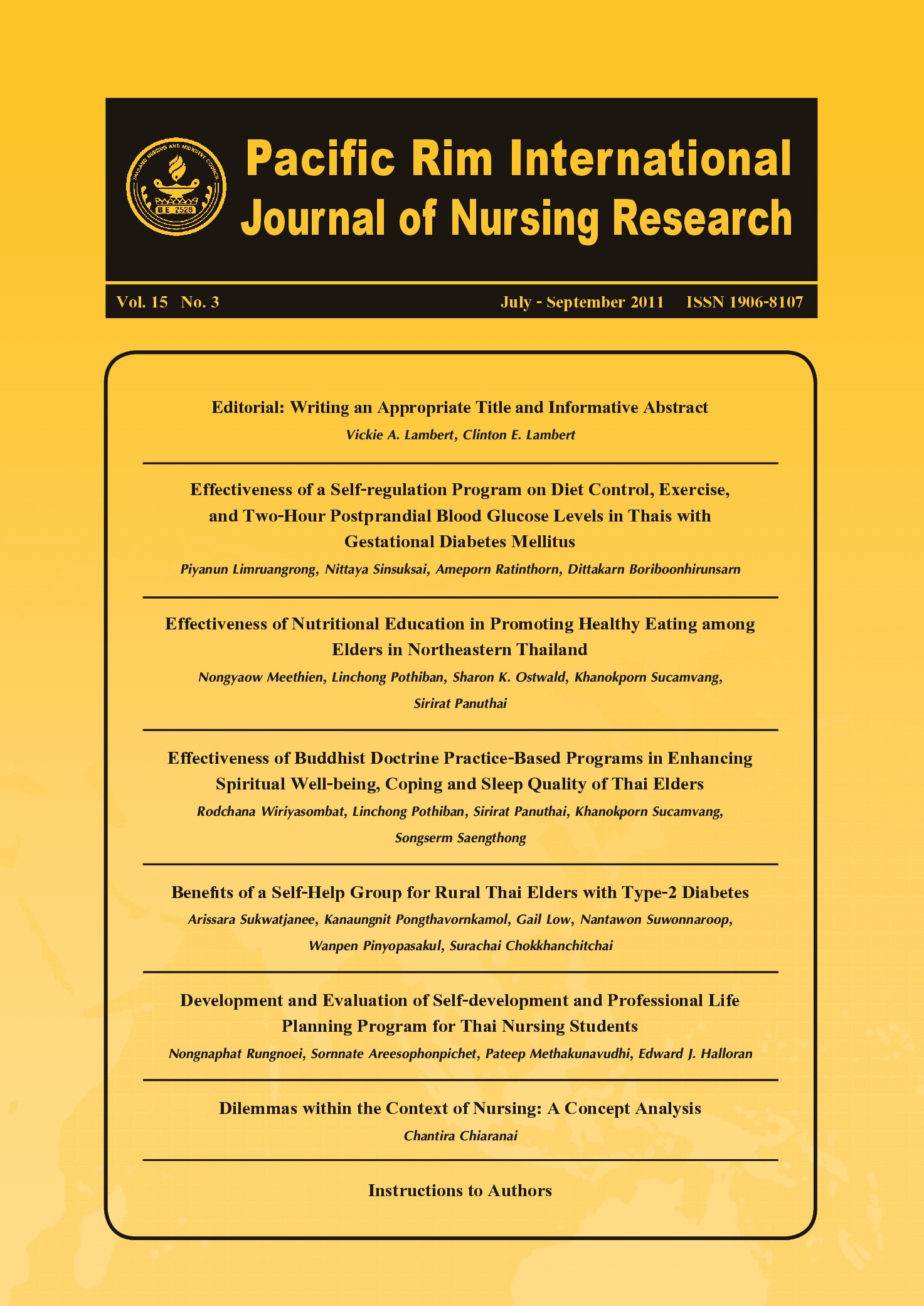Effectiveness of Nutritional Education in Promoting Healthy Eating among Elders in Northeastern Thailand
Keywords:
ผู้สูงอายุ, การบริโภคอาหารเพื่อสุขภาพ, การสอนโภชนศึกษา, Elders, Healthy eating, Nutritional education, ThailandAbstract
บทคัดย่อ
การศึกษาครั้งนี้มีวัตถุประสงค์เพื่อศึกษาผลของโปรแกรมการสอนโภชนศึกษาเพื่อส่งเสริม พฤติกรรมการบริโภคอาหารเพื่อสุขภาพสำหรับผู้สูงอายุที่นำมาใช้โดยพยาบาล โดยศึกษาในกลุ่ม ผู้สูงอายุที่มีอายุตั้งแต่ 60 ปีขึ้นไป ที่อาศัยอยู่นอกเขตเทศบาลในภาคตะวันออกเฉียงเหนือของประเทศไทย กลุ่มตัวอย่างถูกเลือกโดยใช้วิธีการสุ่มแบบหลายขั้นตอนจำนวน 166 ราย ซึ่งถูกสุ่มเข้ากลุ่มทดลอง (ผู้สูงอายุจำนวน 43 รายและสมาชิกในครอบครัวจำนวน 43 ราย) และกลุ่มควบคุม (ผู้สูงอายุจำนวน 40 รายและสมาชิกในครอบครัวจำนวน 40 ราย) กลุ่มทดลองได้รับโปรแกรมการสอนโภชนศึกษา เพื่อส่งเสริมพฤติกรรมการบริโภคอาหารเพื่อสุขภาพซึ่งถูกสร้างขึ้นโดยผู้วิจัย ในขณะที่กลุ่มควบคุมได้รับ การดูแลตามปกติ ได้แก่ กิจกรรมการสอนสุขศึกษาที่ถูกให้โดยบุคลากรทางสุขภาพในชุมชน โปรแกรม การสอนโภชนศึกษาถูกสร้างขึ้นบนกรอบแนวคิดการส่งเสริมสุขภาพของเพนเดอร์และวิธีการสอนแบบ หลากหลาย อันประกอบไปด้วยการสอนแบบรายกลุ่มและการให้คำปรึกษารายบุคคล การเพิ่มความรู้ ด้านโภชนาการและทักษะในการปฏิบัติ การเพิ่มการรับรู้ความสามารถของตนเอง การเพิ่มการรับรู้ ประโยชน์ของการปฏิบัติ ในขณะที่ลดการรับรู้อุปสรรคของการปฏิบัติ นอกจากนั้นยังเพิ่มการได้รับการ สนับสนุนของสมาชิกในครอบครัวของผู้สูงอายุ โดยทำการเก็บข้อมูลทั้งในกลุ่มทดลองและกลุ่มควบคุม โดยใช้แบบบันทึกข้อมูลส่วนบุคคลและข้อมูลที่เกี่ยวข้องกับสุขภาพ และใช้แบบวัดพฤติกรรมการ บริโภคอาหารเพื่อสุขภาพสำหรับผู้สูงอายุ ซึ่งทำการเก็บข้อมูลก่อนการให้โปรแกรมและภายหลัง โปรแกรมสิ้นสุดแล้วที่ 1 สัปดาห์และ 12 สัปดาห์ วิเคราะห์ข้อมูลส่วนบุคคลและข้อมูลที่เกี่ยวข้องกับ สุขภาพด้วยสถิติเชิงพรรณนา ในขณะที่การทดสอบประสิทธิผลของโปรแกรมฯวิเคราะห์ด้วยสถิติ ความแปรปรวนทางเดียวและสองทางแบบวัดซ้ำ
ผลการวิจัยพบว่า ภายหลังการเข้าร่วมโปรแกรมฯ กลุ่มทดลองมีคะแนนพฤติกรรมการบริโภค อาหารเพื่อสุขภาพโดยรวม และคะแนนพฤติกรรมการบริโภคอาหารเพื่อสุขภาพรายด้าน ได้แก่ การเลือก ซื้ออาหาร การเตรียมอาหาร และการรับประทานอาหารมากกว่ากลุ่มควบคุมอย่างมีนัยสำคัญทางสถิติ และเช่นเดียวกันกลุ่มทดลองมีคะแนนพฤติกรรมการบริโภคอาหารเพื่อสุขภาพมากกว่ากลุ่มควบคุม ภายหลังการสิ้นสุดโปรแกรมที่ 1 สัปดาห์และ 12 สัปดาห์ จากการศึกษาในครั้งนี้แสดงให้เห็นว่าโปรแกรม การสอนโภชนศึกษาสามารถนำไปใช้เพื่อส่งเสริมพฤติกรรมการบริโภคอาหารเพื่อสุขภาพสำหรับผู้สูงอายุ ในภาคตะวันออกเฉียงเหนือของประเทศไทยได้
คำสำคัญ : ผู้สูงอายุ, การบริโภคอาหารเพื่อสุขภาพ, การสอนโภชนศึกษา
Abstract
The purpose of this study was to examine the effects of a nurse-led nutritional education program in promoting healthy eating among elders, 60 years of age and older, who lived in non-municipal areas of northeastern Thailand. A multistage sampling method was used to obtain 166 subjects who were randomly assigned to either the experimental group (43 elders and 43 family members) or control group (40 elders and 40 family members). The experimental group participated in the researcher-developed nutritional education program, whereas the control group received usual care, including routine health education activities provided by health care personnel in the community. The nutritional education program was based on Pender’s Health Promotion Model and multiple educational methods, including group teaching and individual counseling, to increase the subjects’ nutritional knowledge/skills, perceived self-efficacy and benefits for healthy eating, while decreasing perceived barriers to healthy eating. Family members were urged to provide social support to encourage their respective elder’s healthy eating. Data were collected, on subjects in both the experimental and control groups, via the researcher-developed Demographic and Health Related Issues Collection Form and the Elderly Healthy Eating Scale, prior to the experimental group entering the educational program, as well as at one week and 12 weeks after the experimental group completed the program. Descriptive statistics were used to assess the demographics and health-related issues, while one-way and two-way repeated measures ANOVA were used to test the effectiveness of the educational program.
Results showed the experimental group had significantly higher scores on overall healthy eating and healthy eating sub-dimensions (i.e. food selection, preparation and consumption) than did the control group. The experimental group also had higher healthy eating scores, than the control group, one week and 12 weeks after completing the education program. The findings suggest the nutritional education program can be used to promote healthy eating among elders in northeastern Thailand.
Keywords : Elders, Healthy eating, Nutritional education, Thailand
Downloads
How to Cite
Issue
Section
License
Copyright: The Pacific Rim International Journal of Nursing Research, Thailand Nursing & Midwifery Council has exclusive rights to publish, reproduce and distribute the manuscript and all contents therein.








.png)



